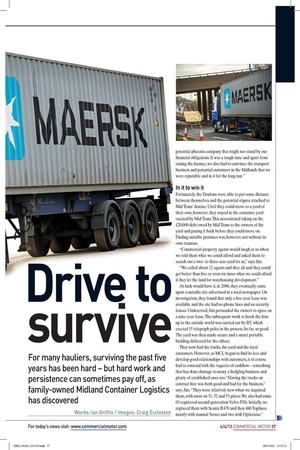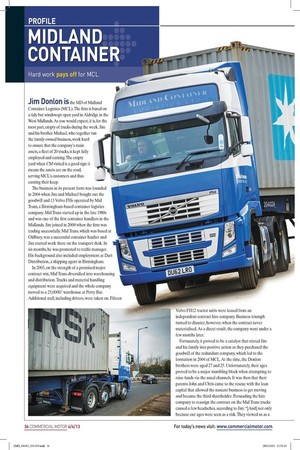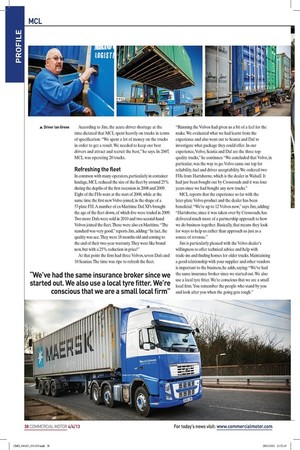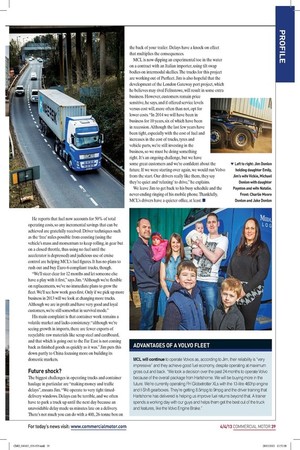Drive to survive For many hauliers, surviving the past five
Page 24

Page 23

Page 25

Page 26

If you've noticed an error in this article please click here to report it so we can fix it.
years has been hard but hard work and persistence can sometimes pay off, as family-owned Midland Container Logistics has discovered Nords: Ian Griffin / Images: Craig Eccteston Jim Donlon is the MD of Midland Container Logistics (MCL). The firm is based on a tidy but windswept open yard in Aldridge in the West Midlands. As you would expect, it is, for the most part, empty of trucks during the week. Jim and his brother Michael, who together run the family-owned business, work hard to ensure that the company's main assets, a fleet of 20 trucks, is kept fully employed and earning. The empty yard when CMvisited is a good sign: it means the assets are on the road, serving MCL's customers and thus earning their keep.
The business in its present form was founded in 2004 when Jim and Michael bought out the goodwill and 13 Volvo FHs operated by Mid Trans, a Birmingham-based container logistics company. Mid Trans started up in the late 1980s and was one of the first container handlers in the Midlands. Jim joined in 2000 when the firm was trading successfully. Mid Trans, which was based at Oldbury, was a successful container haulier and Jim started work there on the transport desk. In six months, he was promoted to traffic manager. His background also included employment at Dart Distribution, a shipping agent in Birmingham.
In 2003, on the strength of a promised major contract win, Mid Trans diversified into warehousing and distribution. Trucks and material handling equipment were acquired and the whole company moved to a 25,000ft2 warehouse at Perry Bar. Additional staff including drivers, were taken on. Fifteen Volvo FH12 tractor units were leased from an independent contract hire company. Business triumph turned to disaster, however, when the contract never materialised. As a direct result, the company went under a few months later.
Fortunately, it proved to be a catalyst that stirred Jim and his family into positive action as they purchased the goodwill of the redundant company, which led to the formation in 2004 of MCL. At the time, the Donlon brothers were aged 27 and 25. Unfortunately, their ages proved to be a major stumbling block when attempting to raise funds via the usual channels. It was then that their parents John and Chris came to the rescue with the loan capital that allowed the nascent business to get moving and became the third shareholder. Persuading the hire company to reassign the contract on the Mid Trans trucks caused a few headaches, according to Jim: "[And] not only because our ages were seen as a risk. They viewed us as a potential phoenix company that might not stand by our financial obligations. It was a tough time and apart from raising the finance, we also had to convince the transport business and potential customers in the Midlands that we were reputable and in it for the long run."
In it to win it Fortunately, the Donlons were able to put some distance between themselves and the potential stigma attached to Mid Trans' demise. Until they could move to a yard of their own, however, they stayed in the container yard vacated by Mid Trans. This necessitated taking on the £20,000 debt owed by Mid Trans to the owners of the yard and paying it back before they could move on. Finding suitable premises was, however, not without its own traumas.
"Commercial property agents would laugh at us when we told them what we could afford and asked them to search out a twoto three-acre yard for us," says Jim.
"We called about 12 agents and they all said they could get better than five or even six times what we could afford if they let the land for warehousing development."
As luck would have it, in 2006, they eventually came upon a suitable site advertised in a local newspaper. On investigation, they found that only a five-year lease was available and the site had no phone lines and no security fences. Undeterred, Jim persuaded the owners to agree on a nine-year lease. The subsequent work to hook the firm up to the outside world was carried out by BT, which erected 15 telegraph poles in the process. So far, so good. The yard was then made secure and a smart portable building delivered for the offices.
They now had the trucks, the yard and the loyal customers. However, as MCL began to find its feet and develop good relationships with customers, it of course had to contend with the vagaries of cashflow — something that has done damage to many a fledgling business and plenty of established ones too. "Having the trucks on contract hire was both good and bad for the business," says Jim. "They were relatively new when we acquired them, with most on 51,52 and 53 plates. We also had some 03 registered second-generation Volvo FHs. Initially, we replaced them with Scania R470 and then 480 Toplines, mostly with manual 'boxes and two with Opticruise." According to Jim, the acute driver shortage at the time dictated that MCL spent heavily on trucks in terms of specification. "We spent a lot of money on the trucks in order to get a result. We needed to keep our best drivers and attract and recruit the best," he says. In 2007, MCL was operating 20 trucks.
Refreshing the fleet In common with many operators, particularly in container haulage, MCL reduced the size of the fleet by around 25% during the depths of the first recession in 2008 and 2009. Eight of the FHs went at the start of 2008, while at the same time the first new Volvo joined, in the shape of a 57-plate FH. A number of ex-Maritime Daf XFs brought the age of the fleet down, of which five were traded in 2009. Two more Dafs were sold in 2010 and two second-hand Volvos joined the fleet. These were also ex-Maritime. "The standard was very good," reports Jim, adding: "In fact, the quality was ace. They were 18 months old and coming to the end of their two-year warranty. They were like brand new, but with a 25% reduction in price!"
At that point the firm had three Volvos, seven Dafs and 10 Scanias. The time was ripe to refresh the fleet. "Running the Volvos had given us a bit of a feel for the make. We evaluated what we had learnt from the experience and also went out to Scania and Daf to investigate what package they could offer. In our experience, Volvo, Scania and Daf are the three topquality trucks," he continues. "We concluded that Volvo, in particular, was the way to go. Volvo came out top for reliability, fuel and driver acceptability. We ordered two FHs from Hartshorne, which is the dealer in Walsall. It had just been bought out by Crossroads and it was four years since we had bought any new trucks."
MCL reports that the experience so far with the later-plate Volvo product and the dealer has been beneficial. "We're up to 12 Volvos now," says Jim, adding: "Hartshorne, since it was taken over by Crossroads, has delivered much more of a partnership approach to how we do business together. Basically, that means they look for ways to help us rather than approach us just as a source of revenue."
Jim is particularly pleased with the Volvo dealer's willingness to offer technical advice and help with trade-ins and finding homes for older trucks. Maintaining a good relationship with your supplier and other vendors is important to the business, he adds, saying: "We've had the same insurance broker since we started out. We also use a local tyre fitter. We're conscious that we are a small local firm. You remember the people who stand by you and look after you when the going gets tough." He reports that fuel now accounts for 50% of total operating costs, so any incremental savings that can be achieved are gratefully received. Driver techniques such as the 'free' miles possible from coasting (using the vehicle's mass and momentum to keep rolling, in gear but on a closed throttle, thus using no fuel until the accelerator is depressed) and judicious use of cruise control are helping MCL's fuel figures. It has no plans to rush out and buy Euro-6-compliant trucks, though.
"We'll steer clear for 12 months and let someone else have a play with it first," says Jim. "Although we're flexible on replacements, we've no immediate plans to grow the fleet. We'll see how work goes first. Only if we pick up more business in 2013 will we look at changing more trucks. Although we are in profit and have very good and loyal customers, we're still somewhat in survival mode."
His main complaint is that container work remains a volatile market and lacks consistency: "although we're seeing growth in imports, there are fewer exports of recyclable raw materials like scrap steel and cardboard, and that which is going out to the Far East is not coming back as finished goods as quickly as it was." Jim puts this down partly to China focusing more on building its domestic markets.
Future shock?
The biggest challenges in operating trucks and container haulage in particular are "making money and traffic delays", moans Jim. "We operate to very tight timeddelivery windows. Delays can be terrible, and we often have to park a truck up until the next day because an unavoidable delay made us minutes late on a delivery. There's not much you can do with a 40ft, 26-tonne box on the back of your trailer. Delays have a knock-on effect that multiplies the consequences.
MCL is now dipping an experimental toe in the water on a contract with an Italian importer, using tilt swap bodies on intermodal skellies. The trucks for this project are working out of Purfleet. Jim is also hopeful that the development of the London Gateway port project, which he believes may rival Felixstowe, will result in some extra business. However, customers remain price sensitive, he says, and if offered service levels versus cost will, more often than not, opt for lower costs. "In 2014 we will have been in business for 10 years, six of which have been in recession. Although the last few years have been tight, especially with the cost of fuel and increases in the cost of trucks, tyres and vehicle parts, we're still investing in the business, so we must be doing something right. It's an ongoing challenge, but we have some great customers and we're confident about the future. If we were starting over again, we would run Volvo from the start. Our drivers really like them, they say they're quiet and 'relaxing' to drive," he explains.
We leave Jim to get back to his busy schedule and the never-ending ringing of his mobile phone. Thankfully, MCL's drivers have a quieter office, at least. • ADVANTAGES OF A VOLVO FLEET MCL will continue to operate Volvos as, according to Jim, their reliability is "very impressive" and they achieve good fuel economy, despite operating at maximum gross out and back. "We took a decision over the past 24 months to operate Volvo because of the overall package from Hartshorne. We will be buying more in the future. We're currently operating FH Globetrotter XLs with the 13-litre 460hp engine and I-Shift gearboxes. They're getting 8.5mpg to 9mpg and the driver training that Hartshorne has delivered is helping us improve fuel returns beyond that. A trainer spends a working day with our guys and helps them get the best out of the truck and features, like the Volvo Engine Brake."









































